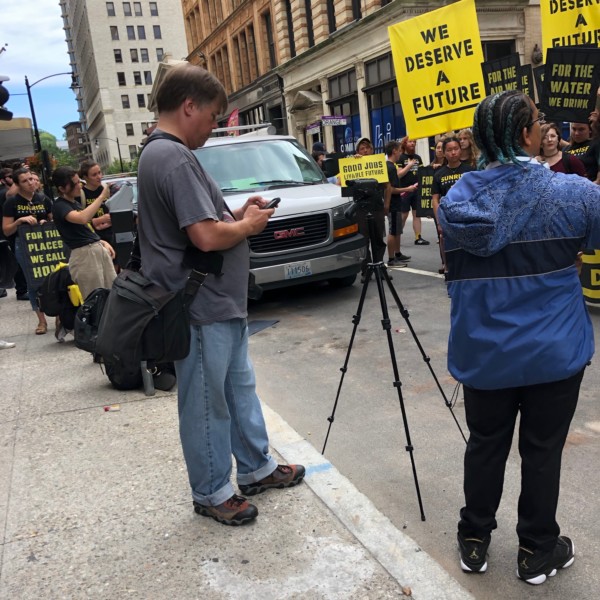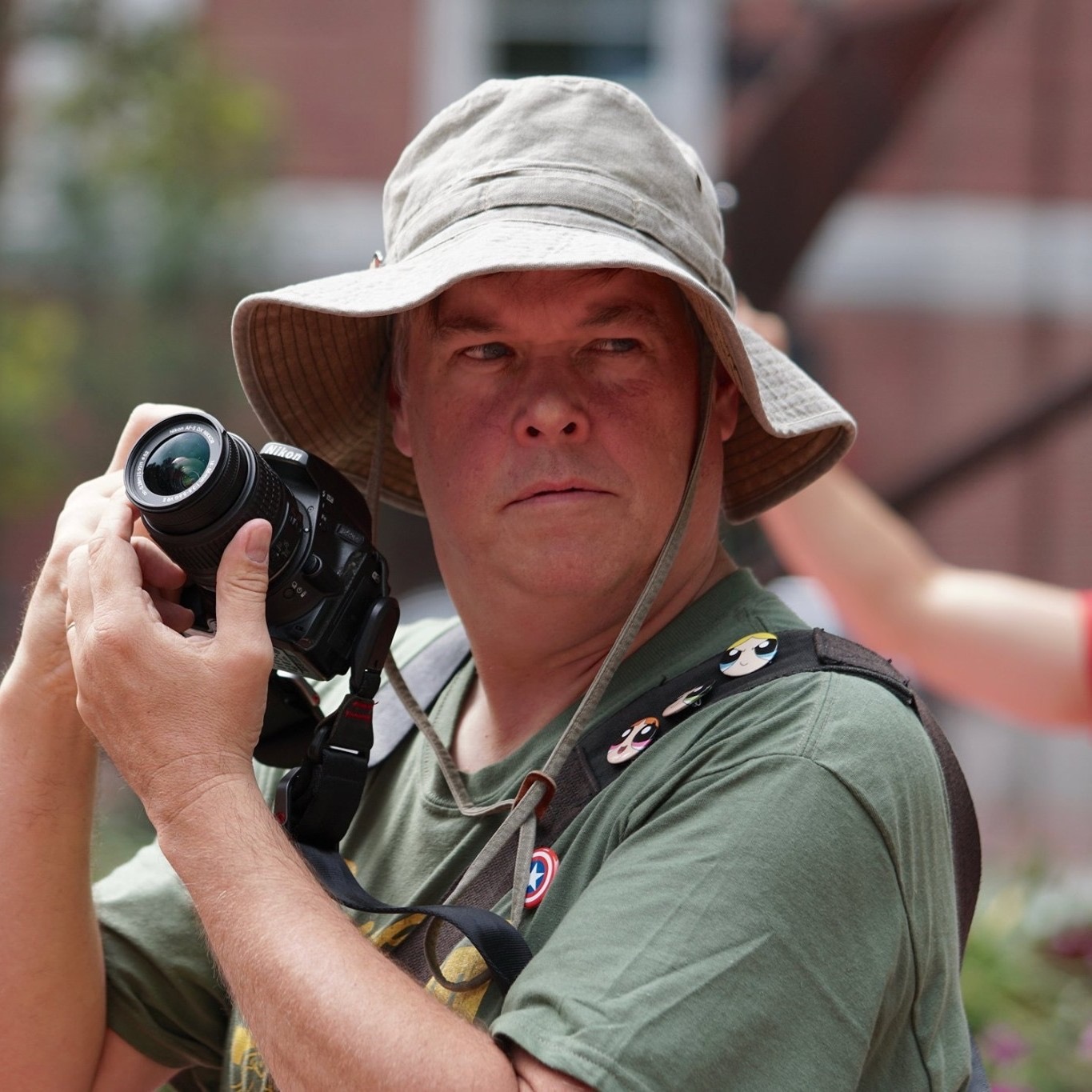Sign up for The Media Today, CJR’s daily newsletter.
On a recent morning, Steve Ahlquist stood with more than 200 activists from the Sunrise Movement in front of US Senator Sheldon Whitehouse’s office in Providence, Rhode Island. Ahlquist—the founder of UpriseRI, a one-person news site that covers social justice and climate-change issues, among others—had arrived at the scene two hours before the first TV news reporter. He juggled two cameras, one for video and one for photographs, and a phone for tweets. He wore rolled-up jeans, hiking shoes, and, as always, his Captain America t-shirt and matching shield pin.
During the rally, Ahlquist recorded climate-crisis activists’ comments and their chants for a Green New Deal. When a Sunrise organizer announced that a small group would enter Whitehouse’s office building to demand he sign the Green New Deal pledge, Ahlquist ran to get ahead of the activists, so he could record their entrance. He stayed with activists for the duration of their action, which also included a stop at the office of Rhode Island Governor Gina Raimondo. Before the day’s end, he published more than 20 videos on his site, and reported that the governor, who one office worker claimed was out-of-state, had actually just left the building.
“That’s how you get stories,” Ahlquist says. “You don’t leave.” After a recent story, in which Ahlquist transcribed a contentious exchange between Woonsocket city councilors over white nationalism, one reader asked Ahlquist whether he was “the only one reporting on this.”
ICYMI: Journalists need more help than ever coping with trauma
Ahlquist’s reporting—lots of video, with introductions and transcripts of key moments, along with policy explainers and occasional investigative stories—centers the perspectives of advocates, and lets them speak for themselves. According to some of the state’s veteran reporters, Ahlquist is an “advocate journalist” or a “blogger”— not a reporter like them. But those same journalists—along with numerous residents, climate activists, and progresive politicians—see Ahlquist as someone who works tirelessly to fill the local-media gaps in Providence. For Rhode Island residents taking on the state’s most powerful forces, Ahlquist’s reporting is indispensable to their movements.

Ahlquist covers a Sunrise Movement protest. Photo by Julia Rock.
MANY CREDIT AHLQUIST with informing and sustaining the movement against a proposed fracked-gas power plant in Burrillville, a town in northwestern Rhode Island. Invenergy, a multinational power-plant developer, proposed the construction of a new natural-gas power plant there in October 2015. Initially, it seemed inevitable that the project would be approved; Rhode Island’s Energy Facilities Siting Board had approved every power-plant project that reached its desk in the agency’s nearly 30-year history, and Governor Gina Raimondo had publicly supported the project. Beyond that, the state’s powerful building trade unions favored the project for the hundreds of construction jobs it was slated to create.
Burrillville residents began to organize against the proposed project, which was poised to become the most expensive private-infrastructure project in state history. At that time Ahlquist was a former comic book store owner who was three years into his first reporting job for a small, progressive news blog. He had little experience covering environmental issues, but felt compelled to step in. “There was no regular coverage of this really important event,” Ahlquist says. “I just felt like I was needed there.”
Soon, Ahlquist was traveling to Burrillville for nearly every plant-related meeting, hearing, and protest. Rather than mire his readers in wonky details, he parsed complicated statements to the Siting Board in plain language, created charts to explain energy-pricing schemes, and provided readers with information on which legal documents concerning the power plant would be public and which would be private. His painstaking analysis of the history of utility restructuring in Rhode Island, which included a glossary of important acronyms, undermined the testimony of Invenergy lawyers. That analysis concluded, “Invenergy attempts to baffle the EFSB with bullshit,” leaving readers with no doubt as to which side he stood on.
Other news outlets occasionally ran stories about the Invenergy proposal in its early days, but, for the most part, Burrillville residents felt unseen. “When everybody else had walked away, Steve was here,” says Donna Woods, who grew up in Burrillville and whose family members had been displaced by another power-plant project. “Deals are made in the darkness, and here is Steve, shining a floodlight on every detail.”
Community members who saw Ahlquist’s reporting as indispensable to their movement stepped in. Some handed him cash at events; others contributed to his site online or conducted research to share with Ahlquist for his reporting. ‘Steve is a state treasure,’ one supporter says. ‘Who else is doing what he does? Nobody.’
Journalists “would do sensational stuff,” Denise Potvin, another resident of Burrillville involved in the movement against the power plant, says. “But they really didn’t do the long story. It was like ‘Oh, those rednecks.’ They summed us up to nothing.” Without Ahlquist, Potvin says, the concerns of Burrillville residents wouldn’t have caught the attention of elected officials and activists across the state.
Over the course of four years, Ahlquist covered long evening meetings, legal filings, industry fundraisers, and the varying levels of support offered by elected officials. Even as Ahlquist’s life became more complicated—his wife battled stage four colorectal cancer at the time—it never occurred to him to stop showing up. “My thoughts were always, ‘How can I keep doing this on a meager, shoestring budget?’ ”
Community members who saw Ahlquist’s reporting as indispensable to their movement stepped in. Some handed him cash at events; others contributed to his site online or conducted research to share with Ahlquist for his reporting. A long-time visitor to Ahlquist’s comic book store and ardent supporter of his work even loaned Ahlquist her car, and added him to her insurance. “Steve is a state treasure,” she says. “Who else is doing what he does? Nobody.”
FIFTEEN YEARS AGO, the Providence Journal, the only statewide daily newspaper, had three reporters covering energy and environmental news. The Journal has laid off over 100 employees since then; now, only one reporter, Alex Kuffner, remains on the energy and environmental beat. The Public’s Radio, Rhode Island’s NPR affiliate, lost its own environmental reporter last year and did not replace her, leaving Kuffner and ecoRI, a local environmental news site, to report on all energy and environmental issues in one of the nation’s fastest-warming states.
Kuffner could not attend every Burrillville meeting, and says he often relied on Ahlquist’s videos of the power plant hearings. “Steve was at nearly every single meeting,” Kuffner says, “What he does a lot of times is a public service.”
UpriseRI does not read like a traditional news site. While covering the Burrillville story, Ahlquist testified in front of the Rhode Island legislature that the state’s Energy Facilities Siting Board was an anti-democratic institution that should be abolished in favor of a more democratic process to approve power plants. (“Optimally, the EFSB should vet projects and pass worthy projects onto the voters for approval,” Ahlquist testified, in comments he later posted to UpriseRI. “The projects should be voted on by the local community and by the state as a whole, if appropriate.”) Ahlquist identified with the movement against the power plant, something he doesn’t think undermined his journalism or introduced ethical conflicts. “I try to focus on truth, not balance,” Ahlquist says. “It’s not balance when one side is lying.”
In November 2017, Ahlquist was denied entry into an event hosted by New England Coalition for Affordable Energy and Rhode Islanders for Affordable Energy. When Ahlquist tried to cover the event, a public relations officer wrote in an email, “We’re inviting only non-partisan/non-activist outlets like the ProJo, NPR, etc.” Ahlquist reported from outside the event, where protesters gathered, and criticized access as“limited to those outlets organizers felt would be friendly to the views of fossil fuel companies.” Kuffner, the Journal reporter, attended the event, recorded the entire thing, and shared it with Ahlquist.
Few people speak as highly of Ahlquist as Jerry Elmer, a senior attorney with the Conservation Law Foundation who led the legal case against the plant. Elmer credits Ahlquist’s reporting with sustaining a passionate and informed activist movement. “Steve expanded the universe of people who were interested and engaged,” Elmer says. Rather than merely post videos of hearings, says Elmer, Ahlquist also shared clips of the most important parts and a description of why it mattered.
Beyond his analysis and video documentation, Ahlquist’s watchdog presence in the room “absolutely” had an effect on the hearings, Elmer says: it reminded board members of public scrutiny, even of highly technical, all-day energy regulatory hearings.
With environmental journalists becoming more scarce as news outlets shutter around the country, Elmer says places without an Ahlquist-like figure “ought and should invent or create one.” In Burrillville, one person with a Patreon account and a few superhero t-shirts has gone a long way.
“I don’t think superheroes are real,” Ahlquist says, “but I try to think like one. Some people think, ‘What would Jesus do?’ I think, ‘What would Captain America do?’”
ICYMI: California’s new 35-story limit for freelancers
Correction: Due to a reporting error, a previous version of this story incorrectly identified the hosts of a 2017 event. This story has also been updated to correct the number of reporters covering energy and the environment for the Providence Journal. CJR regrets the errors.
Has America ever needed a media defender more than now? Help us by joining CJR today.





